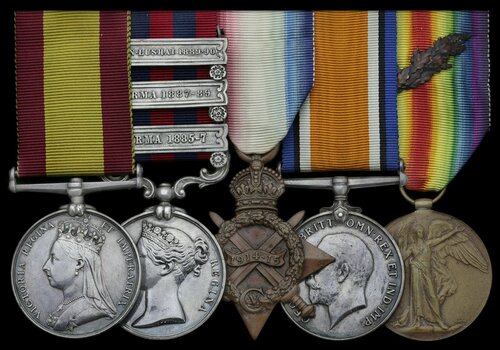
Auction: 21003 - Orders, Decorations and Medals
Lot: 295
Five: Major-General J. G. Hunter C.B., Indian Army Staff Corps, late 70th Foot and 16th Baluch Infantry, who won his laurels in Burma before leading a Brigade in the Great War, only to see his reputation marred by scandal
Afghanistan 1878-80, no clasp (2nd Lieut. J. G. Hunter. 70th Foot.); India General Service 1854-95, 3 clasps, Burma 1885-7, Burma 1887-89, Chin-Lushai 1889-90 (Lieutt J. Gunning Hunter 10th Bl. Infy.); 1914-15 Star (Brigdr. Gen. J. G. Hunter I.A.), unofficially engraved naming, British War and Victory Medals, with M.I.D. oak leaves (Brig. Gen. J. G. Hunter.), contact marks overall, nearly very fine (5)
[C.B.] London Gazette 3 June 1913.
John Gunning Hunter was born on 1 November 1859, the son of Colonel Alexander Hunter and Margaret Julia Hamilton (nee Hunter) at Ootacamund in the Nilgiri Hills, Madras Presidency. Graduating from the Royal Military Academy, he was appointed Second Lieutenant in the 70th (The Surrey) Regiment of Foot on 1 May 1878. Joining the Regiment in time to serve with them during the Second Afghan War, Hunter initially served in the Kandahar Column (led by General Stewart) before joining Major-General Biddulph's Thull Choitali Field Force. Hunter then transferred to the 31st (Huntingdonshire) Regiment of Foot on 13 September with the rank of Lieutenant. He next joined the Bengal Staff Corps (20 October 1880) retaining the rank of Lieutenant in the Indian Army. Posted as Adjutant of the 10th Native Infantry he served in the 1885-87 and 1887-89 Burma Expeditions in 1st Brigade under Brigadier-Generals East and Wolsey respectively, and later in the Pagyi district under Colonel Symons during which he was mentioned in despatches (Hart's Annual Army List 1903 refers). He married Louisa McCallum in 31 March 1885 at St Cuthbert's, Edinburgh. Whilst serving in the 1889-90 Chin-Lushai Expedition he was advanced Captain, on 1 May 1899. During the expedition he was personally charged with the capture of the village of Hanta for which he again received a 'mention' (London Gazette 12 September 1890).
Hunter continued to serve with the 10th, at one point acting as Second-in-Command with the rank of Temporary Major from 6 November 1895. He was appointed to that rank permanently on 15 July 1898 after the 10th N.I. became the 10th Jat Bengal Infantry. The Regiment was renamed the 10th Jats in 1903 and on 1 May the following year Hunter came to command it with the rank of Lieutenant-Colonel. Upon the outbreak of the Great War he travelled to Britain and took command of 122nd Brigade in January 1915 with the rank of Temporary Brigadier General. This unit was part of the Northern Army and was stationed in Newcastle at the time. Transferring to 106th Brigade, 35 (Bantam) Division in July 1915 Hunter joined the war on the Western Front in February 1916 (as such therefore not entitled to a 1914-15 Star). The Brigade's first taste of battle came during the Somme Offensive at the Battle of Albert, when they were placed under the command of 9th (Scottish) Division and most notably played a role in the Battle of Delville Wood in July. Hunter was given a staff role before January 1917 receiving a further 'mention' soon after (London Gazette 4 January 1917, refers) and in September that year he was appointed to the War Office, along with a promotion to Temporary Major-General. It was at this time that his son, Captain Atholl Glenning Hunter, was killed whilst serving in Mesopotamia with the 32nd Lancers (the first British unit to enter Baghdad) on 22 October 1917 and there is a small but fine memorial to him in the Royal Memorial Chapel at the Royal Military Academy Sandhurst.
Hunter continued to serve with the War Office with the rank of Major-General; this he retained upon his retirement in 1919. Unfortunately his retired life was rather unsettled - and though this appears to have been the case before the death of his son, that unhappy incident may well have been a catalyst to negatively affect a reunion between the General and his estranged wife. However, behind the scenes other issues were coming to a head, as reported in the Sunday Post on 5 December 1920 under the headline 'Indian General's Love Affair', the article stating:
'She [his wife] had suspicions that he was carrying on with another woman [...] They went up to a room on the fourth floor. At half-past seven he [a private investigator] saw them go out. They returned at eleven p.m. and went immediately to the fourth floor. The next morning he went to the hotel, and knocked at the door of the bedroom he had seen them enter. Somebody said "Come in." The door was locked but was immediately opened. He entered the room. The Lady was standing in a dressing-gown, and the gentleman was in bed. Witness asked the man if he was Major-General Hunter, and he said "yes".
This incident, aside from being widely reported, led to the swift divorce of Hunter from his wife Louisa in December 1920. He wasted little time in marrying again (March 1921) to Helen Barbara Slater at St. Martin's, London. However he wasn't able to enjoy his new marriage for long, dying at Nantes, France five years later on 11 June 1926.
Subject to 20% VAT on Buyer’s Premium. For more information please view Terms and Conditions for Buyers.
Sold for
£1,600
Starting price
£480




